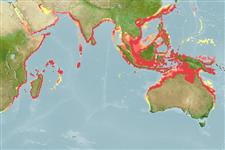Preferred temperature (Ref.
115969): 22.3 - 28.4, mean 26.9 (based on 1175 cells).
Phylogenetic diversity index (Ref.
82804): PD
50 = 0.5000 [Uniqueness, from 0.5 = low to 2.0 = high].
Bayesian length-weight: a=0.00692 (0.00537 - 0.00892), b=3.17 (3.12 - 3.22), in cm Total Length, based on LWR estimates for this species (Ref.
93245).
ระดับชั้นอาหาร (Ref.
69278): 3.5 ±0.37 se; based on food items.
ความสามารถในการกลับคืนสู่ปกติ (Ref.
120179): ความสูง, เวลาต่ำสุดที่จะทำให้ประชากรเพิ่มขึ้นเป็น 2 เท่าใช้เวลาน้อยกว่า 15 เดือน (Preliminary K or Fecundity.).
Fishing Vulnerability (Ref.
59153): Low vulnerability (19 of 100).
